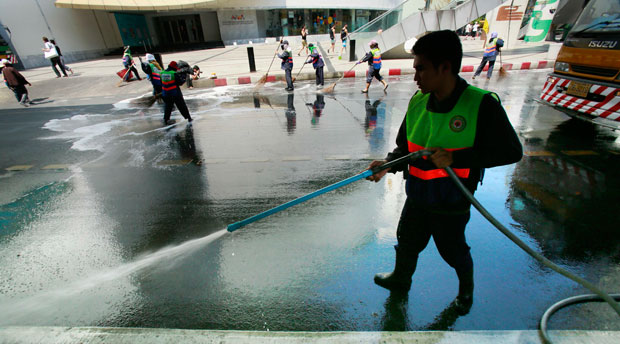Bangkok demonstrators decrease, consolidate protest in park

City workers clean a main protest site in a popular intersection in Bangkok Sunday, March 2, 2014. The anti-government protesters withdrew from several stages erected at key intersections around Bangkok. Starting Monday, they will consolidate at Lumpini Park, a central venue that has become a traditional protest site. AP
BANGKOK—Anti-government protesters in Thailand’s capital began settling in at a park in the center of Bangkok on Sunday, withdrawing from other sites after their numbers began to dwindle and attackers endangered their security.
Protest leader Suthep Thaugsuban addressed the demonstrators at Lumpini Park, vowing to continue the campaign to try to force Prime Minister Yingluck Shinawatra to resign and make way for an unelected interim government that they say would institute anti-corruption reforms.
He earlier said the move to the park—already a protest site—from several major Bangkok intersections was to avoid causing further hardships to the city’s residents.
Since the protests began in early November, the demonstrators’ tactics have included blockading and occupying government offices. In mid-January, they began occupying key Bangkok streets to tie up traffic. However, life had continued much as normal in most of the capital, despite several pitched battles with police.
“We are trying to minimize the effect (of the protests) on the Bangkok people, who by and large are our supporters, and we want to consolidate all the stages so that we can actually reinvigorate our supporters to create more pressure on the government, which is our main target,” protest group spokesman Akanat Promphan said Saturday, as the demonstrators disassembled structures, gathered rubbish and scrubbed down streets to prepare for their move. However, an affiliated protest led by a Buddhist monk near government offices in Bangkok’s northern suburbs is continuing.
Article continues after this advertisementLessening of confrontational politics
Article continues after this advertisementMany Thais hope the move portends a lessening of confrontational politics that has turned increasingly violent. Twenty-three people have been killed in the violence and hundreds hurt.
Suthep last week made a highly conditional offer to negotiate with Yingluck, shifting from the absolute refusal he maintained for months.
Yingluck responded that her government wants negotiations, but that the protesters must stop blocking elections and other constitutional processes, and that it was her duty to defend democracy.
Yingluck called early elections last year soon after the protests picked up steam, but the polls held in early February were disrupted by protesters and remain incomplete. Voting took place Sunday without incident in five provinces where polling had been previously blocked, but make-up voting has yet to be completed in several other areas.
Only when voting is complete will results be announced. But with the opposition Democrat Party, which is closely allied with the protest movement, boycotting the election, it is evident that Yingluck’s Pheu Thai Party will come out on top.
However, legal tangles over the polling process could still stop Parliament from convening to name a new government, and the irregularities caused by the protesters could give cause for the courts to declare the election invalid.
Yingluck faces several legal challenges that could force her from office, and has to contend with a judiciary that has a record of hostility toward her and her political allies.
A court ruling against her could bring her own supporters onto the streets, continuing a cycle of political strife that began in 2006 when then-Prime Minister Thaksin Shinawatra, Yingluck’s brother, was ousted by a military coup after being accused of corruption and abuse of power.